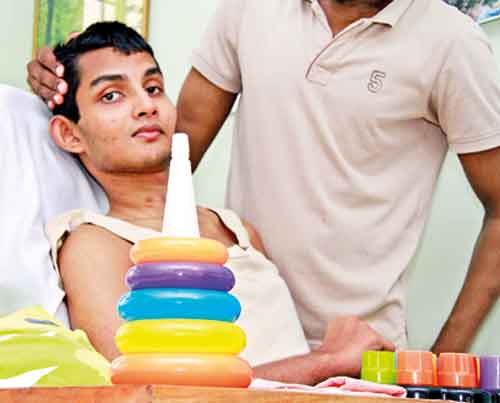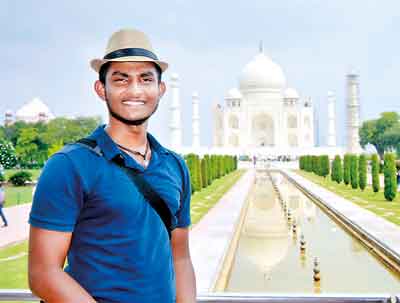In a moment, a young life was shattered

Hiru on the mend slowly and surely after his accident. Pix by Indika Handuwala
It is past noon when we walk into his bedroom to be introduced by his mother. The handsome youth is seated slightly tilted to a side with colourful stuff on a tray before him.
As I say, “Good morning”, he looks at me and then looks up at the wall. I too turn my head and follow his glance and spot the clock indicating that the time is past noon.
“It should be Good Afternoon, isn’t it, silly me,” I say, and he gives me a faintly crooked smile and a slight nod of the head, with a hardly perceptible “Yes”.
We are in the home of 20-year-old Hiru Fernando, down a lane just before the Moratuwa University at Katubedda. Before we meet Hiru who is bed and wheelchair-bound, with a request whether he would allow us to photograph him, we have had a long chat with his Amma.
A strong plea goes out from her to the young: Please be careful on the road. Don’t speed.
A mother and a father, a son and a daughter and life was contented, joyous and happy.
…….Until just past midnight on December 12, 2016, when their lives took a deep dive into sorrow and agony and crumbled into trauma from which there has been an ever-slow recovery, but definitely a recovery.
That early morn, Hiru was involved in a very serious accident, a brush so close to death that his mother was told gently that there was no hope and that life would slip out of him within a few hours. For many others that would have been the reality.
There is hope when we meet them a year after on December 29, 2017, just over a week ago, before we re-live the details of that horror-filled night and the days that followed.
Thaththa who was working abroad was due to return permanently on December 12 and Amma kept it a secret to surprise their son and daughter. But Hiru had told his friends that the fridge was full of puddings and he suspected that Thaththa would arrive before Christmas.
An all-rounder with multiple talents in sports, extracurricular activities and music, Hiru was also “brainy and very good” in his studies. He was a swimmer, basketball player, cadet, pianist, guitarist but most importantly a ‘people’s person’, ready to help others, even animals. He had taken a bowser of water to Yala for thirsty wild animals during the drought.
A popular student of S. Thomas’ College, Mount Lavinia, he had sat the Advanced Level examination in August 2016 from the Commerce stream and was awaiting his results to continue his studies in Australia.
On December 12, 2016, Hiru had a hectic schedule, there was a lot happening in his life — he was due to be Best Man at a cousin’s wedding on the 15th, he was heavily involved in the youth programmes of the Moratumulla Methodist Church and Christmas was around the corner.
Earlier having heard that a group of friends had met with an accident in Polonnaruwa, he had passed the hat around and collected money to send to them.
A very dear friend who lived close by, just about a kilometre away in Lunawa, had come a-visiting on his mother’s scooter. They had many things to attend to and Hiru told his mother that he would be spending the night along with some friends at that home, like he did sometimes.
He got on the scooter and rode away with his friend and that was the parting picture seared into Hiru’s Amma’s memory.
Piecing together what happened that tragic day from friends and the police, she says that they were fast asleep at home, when Hiru who was with friends, suddenly decided to come home around 1.30 in the morning, on his friend’s mother’s scooter. The last text message from his mobile was recorded at 1.20 a.m. telling a friend that he would be attending choir practice that day.
“There is a short-cut with a difficult bend,” says Hiru’s Amma and that’s where he had come very fast, as CCTV has shown. No one knows what happened thereafter. He had somehow lost control and most probably smashed into a lamp-post. It was around this time that she and her daughter had strange dreams and woke up, wondering why.
She sighs that it is an “amuthu” bend, “godak merena thanak”. It was also a lonely road and while Hiru was lying unconscious and mangled there, his friends thought that he was “mehe” (at home) and she assumed he was “ehe” (at his friend’s house).
Usually, police patrols don’t pass that way, she says, adding that the Sergeant told them that something made him instruct his patrol to turn that way and then they came upon what they thought was a small child. They rushed him to the Lunawa Base Hospital, but here even basic necessities for such an emergency were unavailable and finally, the police themselves called the police ambulance and took Hiru to the Colombo South (Kalubowila) Teaching Hospital.
There is much praise for the Colombo South Teaching Hospital from Hiru’s family, as within 20 minutes, they had assessed all the injuries of her broken and bruised son, done all the necessary tests and transferred him to the National Hospital of Sri Lanka (NHSL). Here too everything worked like clockwork.
The family, informed by police through friends whose phone numbers they had got from Hiru’s mobile, finally saw Hiru in the NHSL’s Accident Service and there is a break in her voice when she says that he looked as if he was sleeping. Thaththa had arrived in Sri Lanka the day before and though Hiru was unconscious he had responded to his voice.
Hiru’s mother lists out a few of Hiru’s grievous injuries and trauma soon after the accident and the magnitude is obvious – he was unconscious and barely breathing, he had lost his memory, he was blind, his collar-bone was fractured, two of his ribs were broken, his mandible (lower jaw) was smashed in three places and he had suffered cardiac arrest twice. His brain pressure had sky-rocketed.

Hiru before the accident on holiday in India, posing before the Taj Mahal
“Many, many people prayed and not only Christians but from all religions,” says Amma, adding that she believes that it helped to pull Hiru back from the brink of death.
The road to some semblance of recovery has been long and hard and challenged by many a complication. Hiru had been on the ventilator for 60 long days (two months) and soon after he was weaned off the breathing machine and transferred into the High Dependency Unit, the family had decided to move him to the private Asiri Central Hospital, for two more months.
“Hiru first opened his eyes on Christmas Day, December 25, 2016,” says his mother, ever-grateful to the staff of the Intensive Care Unit of NHSL’s Neurotrauma Unit, for tenderly looking after him, not only medically and surgically but also nursing him back to health even to the extent of shaving him and cutting his hair.
There are special mentions from the grateful family of NHSL’s Consultant Neurosurgeon Dr. Himashi Kularatne and Consultant Neuro-anaesthetist Dr. Manjula Kularatne and Asiri Central Hospital’s Consultant Neurosurgeon Dr. Sunil Perera and Consultant Oral and Maxillofacial Surgeon Dr. N.V. Jayatilaka who restored the handsome features of Hiru through a six-hour surgery involving two platinum plates and 16 screws (there is not a single scar on his face, says his mother). Until the screws were removed in April 2017, Hiru has been on liquid feeds through a peg in his stomach.
April 2017 (last year) they brought him home, having turned the ground floor into a hospital room. By that time his AL results, 1A and three Bs, had been released and he would have been very well qualified to do the double degree he was planning on.
At home, they started from scratch, resorting to music therapy by giving a small keyboard to this young man who used to play the piano and guitar well. Although he has still not got the use of his left limbs back and he is bed and chair bound, four of his fingers of the right hand are now working. They also kept him at the Ragama Rehabilitation Centre for nearly two months and even there his kindness and generosity had been utmost as he had indicated that he was upset because the monk on the bed opposite had no mosquito net.
Now his routine is lots of physiotherapy and occupational therapy and learning to speak again. Hiru communicates with his family from a board on which the alphabet has been written, indicating with nods the line and the letter.
“Hiru is very much a part of the family’s decision-making process,” says Amma, adding that there are chuti, chuti, improvements and they are hopeful, nay certain, that there will be full recovery though it will be a long, long haul.


